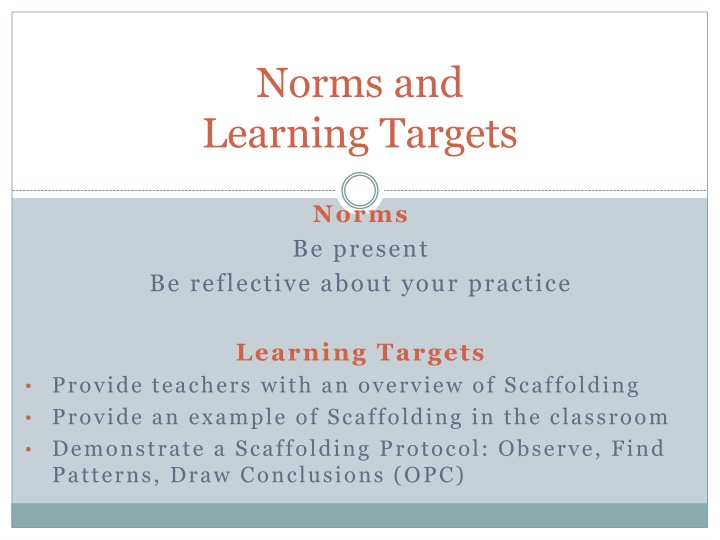
Scaffolding in Education Settings
Explore the essential concepts of scaffolding in education, including its definition, implementation in the classroom, and the gradual release of responsibility. Discover practical examples and strategies for effective scaffolding practices.
Download Presentation

Please find below an Image/Link to download the presentation.
The content on the website is provided AS IS for your information and personal use only. It may not be sold, licensed, or shared on other websites without obtaining consent from the author. If you encounter any issues during the download, it is possible that the publisher has removed the file from their server.
You are allowed to download the files provided on this website for personal or commercial use, subject to the condition that they are used lawfully. All files are the property of their respective owners.
The content on the website is provided AS IS for your information and personal use only. It may not be sold, licensed, or shared on other websites without obtaining consent from the author.
E N D
Presentation Transcript
Norms and Learning Targets Norms Be present Be reflective about your practice Learning Targets Provide teachers with an overview of Scaffolding Provide an example of Scaffolding in the classroom Demonstrate a Scaffolding Protocol: Observe, Find Patterns, Draw Conclusions (OPC)
Define Scaffolding Take a minute define Scaffolding. (2 minutes) Share your thoughts with others at your table. (2 minutes) Next look at the CIF definition and look for commonalities. (2)
The CIF Definition of Scaffolding Scaffolding helps students to connect prior knowledge and experience with new information and ideas. Teachers use information from assessments of prior knowledge to plan a careful sequence of activities that continually links that knowledge and understanding to new knowledge and skill attainment. Teachers challenge students step by step with increasingly more difficult tasks and concepts to ensure they are continuously learning.
Lets Look at Scaffolding in Action Learning to Think: A Foundation for Analysis https://www.teachingchannel.org/videos/t each-students-to-think
Pair/Share: Reflect on your Scaffolding Practice Where do you see yourself on the Gradual Release of Responsibility Diagram? How might you use advertisements as a Scaffolding tool in your classroom?
